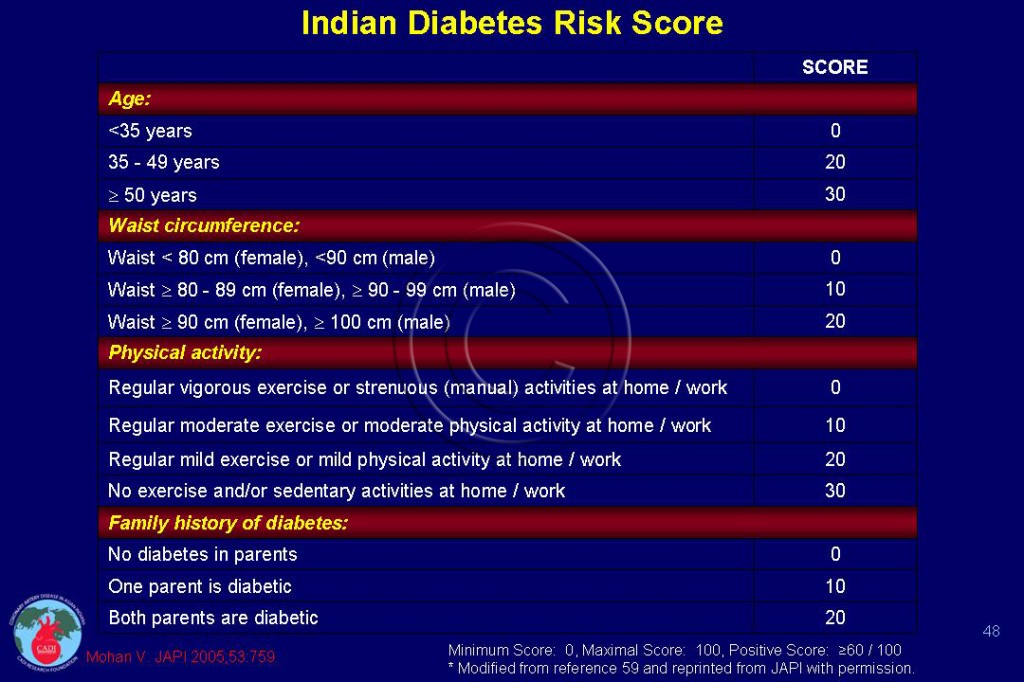The Indian Diabetes Risk Score (IDRS)
- IDRS was developed using four simple parameters namely age, abdominal obesity, family history of diabetes, and physical activity. A maximum score of 100 is given for these categories combined as shown in the Figure 048. It has shown to be a highly cost effective way of testing for diabetes in a resource poor setting like India. IDRS also helps to distinguish type 2 from non-type 2 diabetes mellitus.7

- Subjects with an IDRS of <30 was categorized as low risk, 30-50 as medium risk and those with > 60 as high risk for diabetes.
- The mean IDRS increased significantly from normal (48) to prediabetes (57) to diabetics (61).1-3 Limiting the blood sugar testing to those with an IDRS score of 50 and above could identify more than 90% of Indians with diabetes and prediabetes.1-3
- The Indian Diabetes Risk Score (IDRS) showed the strongest (5-fold risk) association with incident diabetes─ higher than obesity or hypertension.4-6 Obesity and abdominal obesity conferred a 2-fold risk of diabetes, whereas hypertension conferred a 3-fold risk of diabetes. 2, 3
- Higher IDRS is also associated with higher risk of metabolic syndrome and CVD risk even among people without prediabetes or diabetes.1
Sources
1. Mohan V, Sandeep S, Deepa M, Gokulakrishnan K, Datta M, Deepa R. A diabetes risk score helps identify metabolic syndrome and cardiovascular risk in Indians – the Chennai Urban Rural Epidemiology Study (CURES-38). Diabetes, obesity & metabolism. May 2007;9(3):337-343.
2. Mohan V, Deepa M, Farooq S, Narayan KM, Datta M, Deepa R. Anthropometric cut points for identification of cardiometabolic risk factors in an urban Asian Indian population. Metabolism. Jul 2007;56(7):961-968.
3. Mohan V, Deepa M, Farooq S, Prabhakaran D, Reddy KS. Surveillance for risk factors of cardiovascular disease among an industrial population in southern India. Natl Med J India. Jan-Feb 2008;21(1):8-13.
4. Mohan V, Deepa M, Anjana RM, Lanthorn H, Deepa R. Incidence of diabetes and pre-diabetes in a selected urban south Indian population (CUPS-19). J Assoc Physicians India. Mar 2008;56:152-157.
5. Mohan V, Sandeep S, Deepa M, Gokulakrishnan K, Datta M, Deepa R. A diabetes risk score helps identify metabolic syndrome and cardiovascular risk in Indians – the Chennai Urban Rural Epidemiology Study (CURES-38). Diabetes, obesity & metabolism. May 2007;9(3):337-343.
6. Mohan V, Deepa R, Deepa M, Somannavar S, Datta M. A simplified Indian Diabetes Risk Score for screening for undiagnosed diabetic subjects. J Assoc Physicians India. Sep 2005;53:759-763.
7. Sharma KM, Ranjani H, Nguyen H, et al. Indian Diabetes Risk Score helps to distinguish type 2 from non-type 2 diabetes mellitus (GDRC-3). J Diabetes Sci Technol. Mar 2011;5(2):419-425

